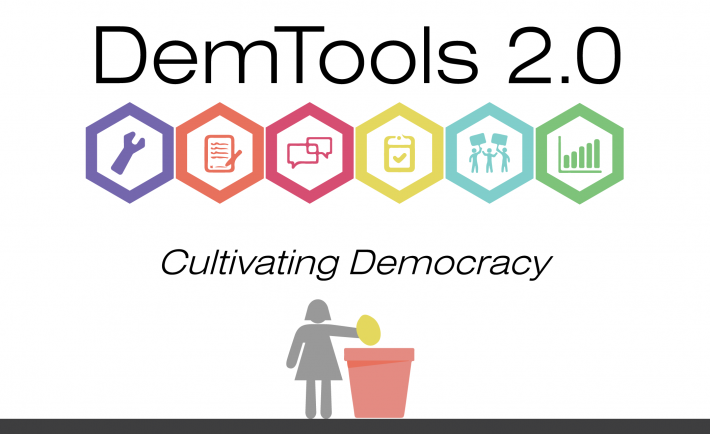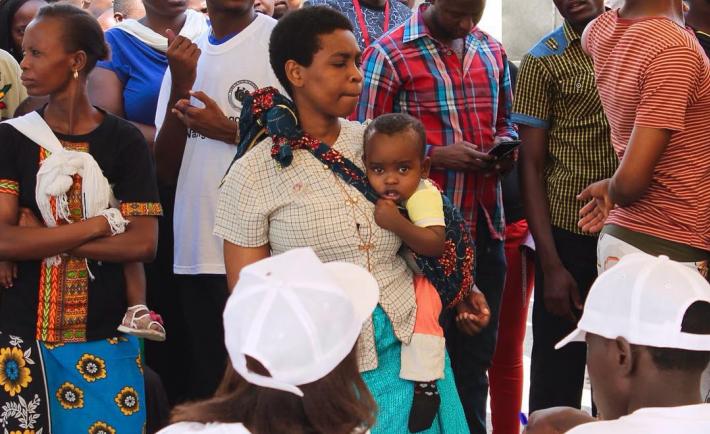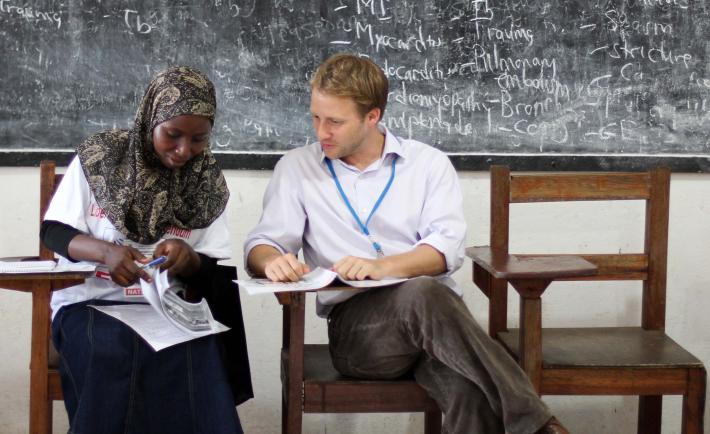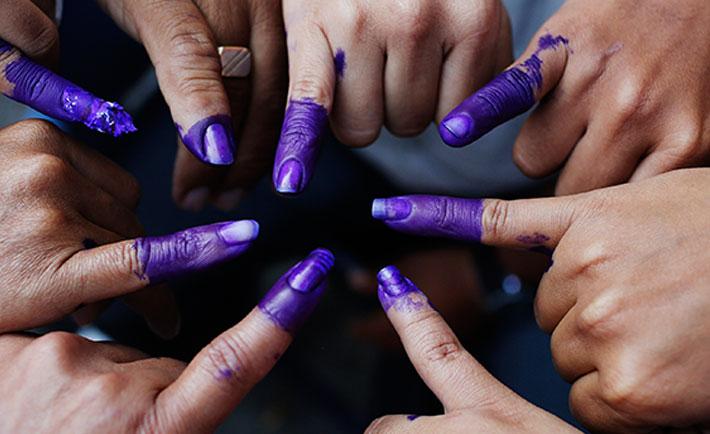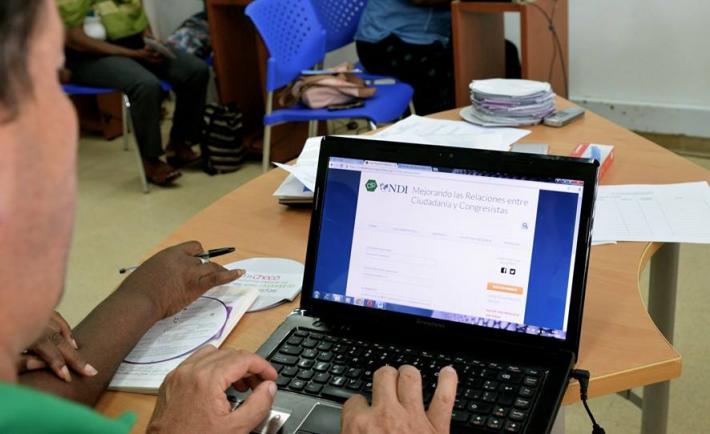On December 9, NDI will unveil DemTools 2.0, which upgrades and expands NDI’s existing suite of tools that promote democratic practices through the Internet, along with three innovative new applications for managing government petitions, crowdsourcing community problems, and open data, mapping and visualization.
DemTools 2.0: Democratizing Access To Political Organizing and Communication Technology
Choose Your Adventure: Hackathon Helps Build Smart Games for Democratic Development

Developers at AWS hackathon burn the midnight oil to create prototype games to teach democratic lessons.
Over 18 grueling hours, more than 200 developers at the ReInvent Conference in Las Vegas hosted by Amazon Web Services (AWS) worked to solve tech challenges submitted by four non-profit organizations: UNICEF, NPR’s Marketplace, Donors Choose and NDI. NDI’s challenge to “design a framework for building story-driven text-based games that convey lessons in an engaging ‘choose your own adventure’ format,” drew more participants than any other project.
Throughout the hackathon -- an event in which a large number of people meet to engage in collaborative computer programming -- five teams worked to deliver functional prototypes of a game system. When it was all over, “Team 29” was declared the winner. The winning team and several other participants committed to bring the demo version to a fully-functional product in the coming months, which NDI will be able to use to enhance its programs.
Violence and Intimidation Against Women In Elections Needs to Stop. Here’s How.
Democratic elections are a fundamental way to peacefully resolve political competition. However, they are also high-stakes games where power is won and lost that can result in conflict and descend into violence. Although such violence affects all citizens, it has a particularly sinister impact on women. Since January alone, the world has seen politically active women stripped publically by police on their way to political and election events, decapitated and stabbed. Their vehicles have been damaged and their campaign materials destroyed. They are denigrated as “eye candy” and accused of having made sex tapes. Election officials and observers have faced violence in their work, and women voters are dismissed by the very parties seeking their votes with sexist language and jokes, or are banned from voting at all.
Join NDI's Panels at the Open Government Partnership Global Summit
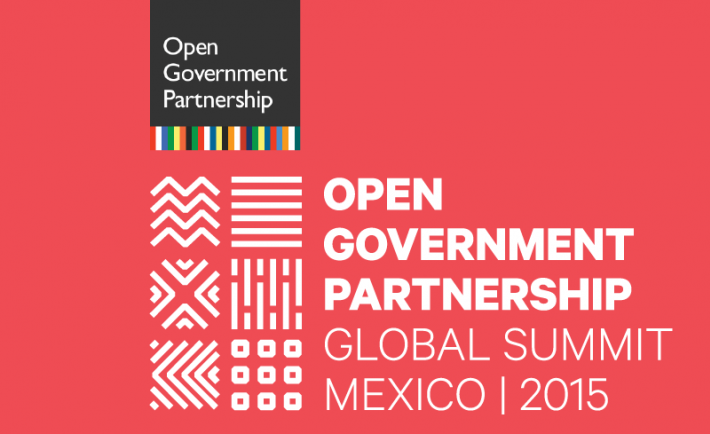
Every two years, the country chair of the Open Government Partnership hosts the OGP Global Summit, the largest gathering of open government practitioners from all over the world.
NDI will be joining leaders from NGOs, the private sector, academia, government, civil society, technologists, and other advocates at the Open Government Partnership (OGP) Summit. The three-day conference, which will be held this week in Mexico City, will convene sessions on a variety of topics, including creating and implementing action plans, engagement with the legislative branch, civil society and parliamentary partnerships, standards and frameworks for parliamentary transparency, Latin America regional updates and efforts on openness, and open election data principles.
One Day, Five Citizen Election Observation Efforts
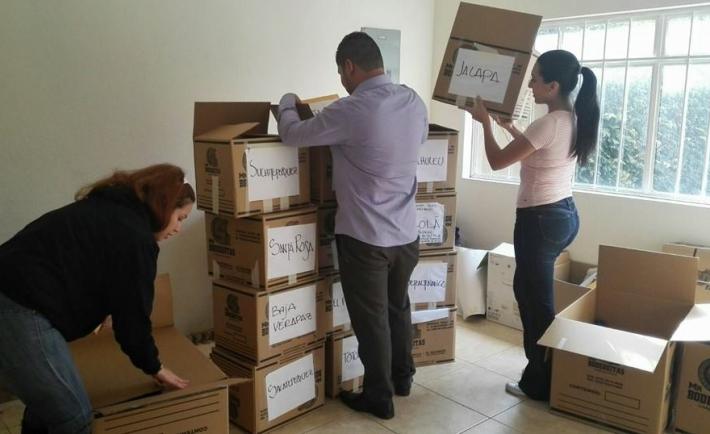
Acción Ciudadana prepares observer kits and other materials for the second round quick count on October 25 in Guatemala. Credit: Acción Ciudadana
Today, 10 countries will hold elections around the world. From local contests to national races, runoff elections to constitutional referendums, no other day this year will have more elections. Civil society, primarily through nonpartisan citizen observers, has been actively monitoring these elections, helping to mitigate violence, deter fraud, impartially assess the processes and, when warranted, enhance public confidence. NDI is helping to build the capacity of citizen election observers in five of the 10 countries with elections on October 25:
“The Medium is the Message” for Relaunched NDItech Blog
On the NDItech team, one of our goals is to share what we learn and highlight the accomplishments of our partners. Our blog -- NDItech.org -- is our primary platform to accomplish that, but it is also a testing ground for improving the accessibility of online platforms across the Institute.
Four New Resources for Promoting Citizen Participation in Fragile Communities
Each week, NDI’s Citizen Participation team provides a resource to assist NDI staff in meeting the objectives of their programs. This past month’s resources discussed how to encourage greater electoral participation in fragile states, young people’s priorities, the relationship between eliminating extreme poverty and citizen participation and alternative approaches to assisting civic movements. These resources highlight the role that citizen participation and inclusive governance play as drivers of social and political development, particularly when it comes to fragile states and vulnerable communities.
The Missing SDG Indicators: Accelerating gender equality and empowerment
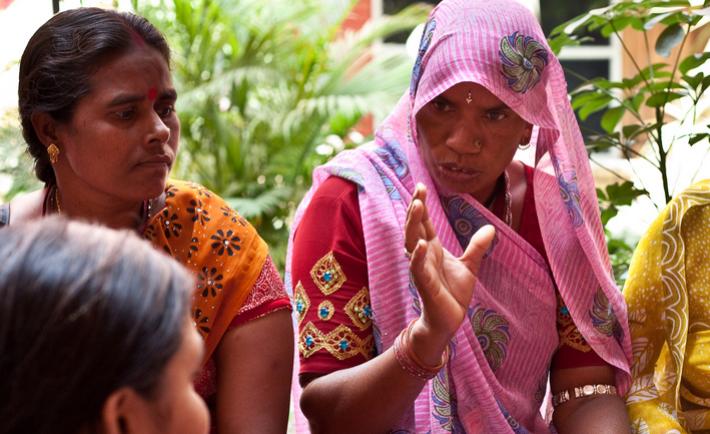
Women leaders in India, where the constitution dictates that one third of seats in local entities are reserved for women. Photo by: Gangajit Singh Chandok / U.N. Women / CC BY-NC-ND
To achieve a world “in which every woman and girl enjoys full gender equality and all legal, social, and economic barriers to their empowerment have been removed,” will require political action — leadership, commitment and accountability. The U.N.’s “Transforming Our World” sustainable development framework, which will be adopted by the General Assembly in the coming days, is the latest call to action. We will all be judged on what we do over the next 15 years to make that ambition into an empowered reality for women and girls. Sustainable development goal 5 to “achieve gender equality and empower all women and girls” expands significantly on the Millennium Development Goals by detailing in a single goal a full range of issues and actions that will drive success. However, in the proposed indicators, which anchor accountability for the new global framework, critical metrics for women’s participation in political life and public decision-making are missing.
A Look Back at our International Democracy Day Tweettalk
In recognition of International Day of Democracy, NDI partnered with the International Republican Institute (IRI) and International Foundation for Electoral Systems (IFES) to host an online discussion. Kenneth Wollack, president of NDI, Michael D. Svetlik, vice president for programs at IFES, and Tom Garrett, vice president for programs at IRI, answered eight democracy-related questions posed by @CEPPS and other TweetTalk participants. Using the hashtag #DemTalk, respondents discussed both general shifts in democratic trends across the world and specific examples of programs that create “space for civil society” -- the theme of this year’s Democracy Day.
Creating Space for Civil Society Through Technology and Open Data
Today is International Day of Democracy, a day meant to inspire reflection and celebration of the principles of democracy worldwide. This year’s theme, “Space for Civil Society,” serves as a reminder that a strong and active civil society is necessary for resilient democracy. This year’s theme is also a reaction to the fact that civil society faces serious challenges globally. Since the early 2000s, authoritarian regimes have used new methods to limit the ability of civil society to protect the rights of citizens, demand accountability from government and engage in public policy. These limitations extend to the Internet and social media; authoritarian regimes continue to curtail political speech and monitor political dissent online. But just as autocratic regimes are imposing these limitations, civil society is adopting new technologies and using open government data to create new civic space and work in parallel with the interests of open, inclusive government. NDI is supporting these efforts by assisting civil society groups in the creation of international norms and standards for legislative openness and open election data.

